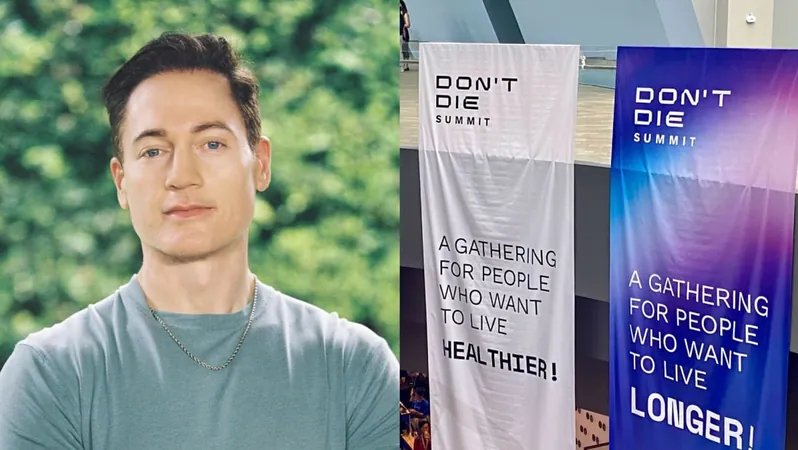
The Controversial 'Don't Die' Movement: A Multimillionaire's Quest for Immortality and Its Implications on Our Life Choices
2024-09-25
In today's fast-paced world, where health and longevity are constantly under discussion, Bryan Johnson—a 47-year-old tech tycoon and multimillionaire—stands at the forefront of a controversial movement known as the “Don't Die” philosophy. Recently, Johnson took his unusual mission to the global stage at the Don’t Die Summit held in Singapore. This summit brought together like-minded individuals and sparked curious reflection in many attendees about the fundamental question: why live longer, when living freely may be enough?
Ordinary survival instincts seem straightforward: eat, sleep, exercise, and maintain overall well-being. Yet, Johnson’s radical commitment to longevity poses a stark contrast, leaning on extreme health protocols that many find hard to digest—both figuratively and literally. After gaining notoriety for bizarre choices such as blood transfusions from his teenage son, Johnson has evolved his approach. Now, he focuses on an elaborate health regimen dubbed Blueprint, proclaiming it enables him to live longer and healthier than average individuals.
Blueprint is no ordinary health plan—it is a numerically driven, AI-influenced algorithm that dictates Johnson’s daily routine, from rigid sleep schedules to the specific supplements he consumes. He claims that by adhering to this structured lifestyle, he has slowed his aging process, outperforming 99% of men in their 20s. Johnson’s day begins at 4:30 AM and he insists on finishing all meals by 11 AM, followed by an exhaustive list of health metrics designed to master his biology rather than leave it up to chance.
There's a dazzling allure to such an extreme dedication toward optimizing health. However, during his presentation, I found myself grappling with the underlying reason for such an obsession. At its core, Johnson's movement raises pressing insights about life’s purpose. Should we strive for longevity at all costs, or is there something inherently valuable in recognizing the fragility of existence?
During the summit, Johnson invited participants onstage to consider whether they would follow the directions of an AI that ensures optimum health. This prompted self-reflection in the audience about autonomy versus the potential benefits of a prescribed life. Could prioritizing a software-guided existence strip away the essence of living freely?
One provocative question posed during the event struck a chord: why do we consider human life so critical that we embark on a quest to defy death? While admires of Johnson's radical lifestyle embrace the mantra of extended life, many questioned the shadows cast by such a pursuit over the human experience. How much joy, spontaneity, and emotional depth do we inadvertently sacrifice for the sake of extending our days?
The summit also showcased a stark dichotomy—those who rigidly adhere to Johnson's philosophy appeared to dismiss the richness of human connection and the unpredictability of life. The rigid structure of his regimen may resonate with some who find comfort in quantifiable results, but for many, it beckoned thoughts of a dystopian existence stripped of a sense of play, personal relationships, and the enjoyment of simple pleasures.
As perspectives collided at the event, I recognized how the 'Don't Die' movement may serve as a reflection of our times, influenced by societal pressures to achieve, optimize, and succeed. The belief that health is the ultimate currency echoed disturbingly in discussions, leading to the conclusion that life’s quality can sometimes be at odds with its mere quantity.
While Bryan Johnson champions the relentless pursuit of biological optimization, I reflected on the wisdom of famous figures like Kanye West, who declared, “Nothing in life is promised except death.” Perhaps, therein lies a valuable lesson—embracing life, with its uncertainties, joys, and inevitable end, could be more genuine than chasing absolute health and extended years through stark algorithms and extreme regimes.
In conclusion, while Johnson's principles entice a modern audience fascinated by the allure of hacking existence, they require a closer examination of what it means to live a fulfilled life. After all, true vitality comes not from merely existing, but from experiencing life fully, with all its imperfections. For me, the journey toward understanding my relationship with life has illuminated an essential truth: wanting to live is not just about quantity—it's about quality too.



 Brasil (PT)
Brasil (PT)
 Canada (EN)
Canada (EN)
 Chile (ES)
Chile (ES)
 España (ES)
España (ES)
 France (FR)
France (FR)
 Hong Kong (EN)
Hong Kong (EN)
 Italia (IT)
Italia (IT)
 日本 (JA)
日本 (JA)
 Magyarország (HU)
Magyarország (HU)
 Norge (NO)
Norge (NO)
 Polska (PL)
Polska (PL)
 Schweiz (DE)
Schweiz (DE)
 Singapore (EN)
Singapore (EN)
 Sverige (SV)
Sverige (SV)
 Suomi (FI)
Suomi (FI)
 Türkiye (TR)
Türkiye (TR)